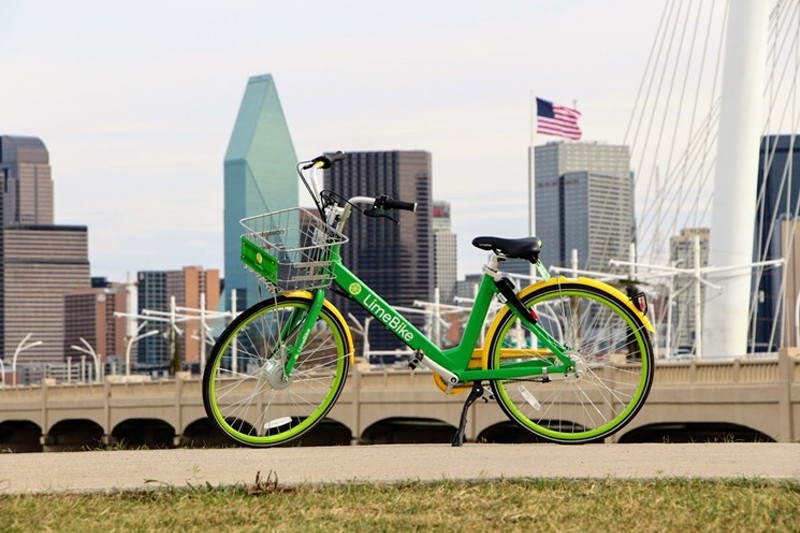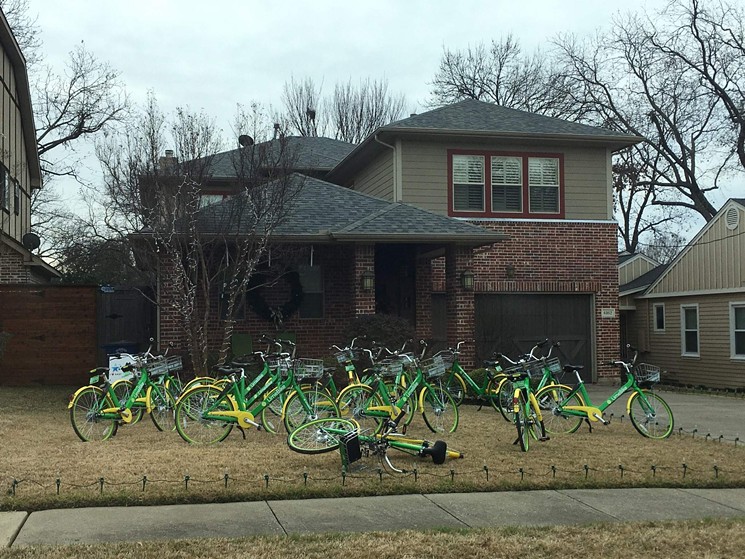While the final details of the ordinance will be ironed out over the next couple of weeks, it's clear that each of the five companies operating in Dallas — Limebike, ofo, VBikes, Spin and MoBike — will have to pay a fee to operate in Dallas city limits, provide data to the city about how riders are using the bikes, and follow rules about where the bikes can be parked and how often they need to be moved so they don't stay in one place too long.
According to an initial proposal from Dallas city staff Wednesday, bike operators will pay the city $776 for an initial permit and $18 per bike per year to operate in Dallas. Permit renewals will run half the initial fee — $388. That cash will pay the salaries of four full-time city employees — City Council member Lee Kleinman praised the plan for being revenue neutral — who will then make sure that the bike companies are abiding by the other rules in the contract.
Those rules, which should be tweaked a little in the weeks before the vote, require that no bike be left in the same spot for more than two days if its in a residential neighborhood or seven days anywhere else. Bikes can't be left on their sides for more than two hours, according to the proposed ordinance, nor can they be parked on a sidewalk less than 8 feet wide or on a wheelchair ramp. The city also plans to identify and paint potential parking spaces for the bikes.
According to representatives from the bike companies at City Hall on Wednesday, the number of bike-share bikes in the city is down considerably from its peak of about 18,000 this winter. The three biggest companies in the city — ofo, Limebike and VBikes — reported having 5,000, 3,000 and 1,000 bikes in Dallas, respectively. Despite the decrease, Dallas Mayor Pro Tem Dwaine Caraway complained, as he has numerous times over the last six months, that the city wasn't getting a docked bike-share program, despite the fact that Dallas has turned down that idea numerous times because of cost.
"Why is it that we're only talking about dockless bikes and not docked bikes as well as dockless," Caraway said. "Your presentation is only about dockless. Bikes are everywhere. Why not talk about docked and dockless?"
City Council member Philip Kingston said those who view the bikes as a nuisance or as clutter on downtown's sidewalks are missing the point."When we're thinking about what is good regulation, cost-benefit analysis is an important thing. We're talking about a decrease in pollution, an increase in exercise and a reduction in congestion on downtown streets." — Philip Kingston
tweet this
"When I hear complaints of clutter or whatever else people are complaining about, we want to address those — the companies have started to," Kingston said. "When we're thinking about what is good regulation, cost-benefit analysis is an important thing. We're talking about a decrease in pollution, an increase in exercise and a reduction in congestion on downtown streets."
The only thing keeping Dallas from being a leading bike-freindly city, Kingston said, is its inability to build bike infrastructure like protected bike lanes. People will continue to ride the rental bikes on the sidewalk, he said, until it is safe to do so in the street.
"The city passed an on-street bike facilities plan in 2011. It was supposed to be finished by 2021 and it will not be," Kingston said. "The city has criminally underfunded [it] at the rate of $500,000 a year. At $500,000 we will never finish the plan."













